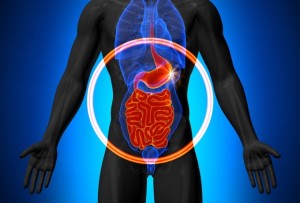- Normal microflora. Your GI is teaming with bacteria that are helping you a whole bunch every day, in ways that are continually being learned about. and Thankfully, more and more people are aware of these friendly gut bacteria. I’d like to differentiate between normal gut flora here and probiotics – probiotics are a supplement that contains helpful bacteria. There are a few reasons to take probiotics. The two main ones in my opinion are: 1) your microflora has been disrupted (eg. From antibiotic use, poor diet, etc) or 2) you have a condition that has been shown to receive benefit from probiotic. Keep in mind, not all probiotics are created equally, and not all strains of probiotics are beneficial for the same purpose (I’m sure more on that in a later blog)
- Digestive enzyme function. After food enters our mouth, it needs to be broken down and absorbed in the GI tract for us to get the full benefits. There are of course medical conditions that can decrease digestive function, but there are also lifestyle factors – stress, especially around eating, can be a major player here. If you’re not breaking down and absorbing proteins and fats, it can not only leave you fatigued, but also can leave you feeling bloated, full, and uncomfortable after meals.
- Food sensitivities. If you are sensitive to foods, they can contribute to inflammation on your GI tract, decreasing proper function. Not only that, it can result in unpleasant symptoms, such as stool changes (loose stools or constipation),
- Inflammation. There are some conditions where this is likely forefront in your doctors mind – specifically Crohn’s disease and ulcerative colitis. However, minor inflammation can be present without these conditions. As stated above, food sensitivities can play a role here. Bacterial imbalance, stress, lack of healthy foods can all also be involved.
- Potential pathogens. There are certain bacteria and yeast that hang out in our digestive tract and seem to cause not too much of a problem until they start to become overgrown. In other words their population is big enough to cause noticeable symptoms. Just because there present, does not mean that at some point they will become overgrown. It may be more likely to occur if other good bacteria are decreased, or with decrease immune system function.
You can see already in this short summary that these factors can all be inter-related. The great thing is that we can use stool testing to look at all these factors together. If you are having GI symptoms it is up to you and your doctor to discuss what testing is right for you. These factors can play individual roles, combined roles, or there could be something different going on in your individual situation. The point is – keep asking questions. If you’re not feeling better on your current treatment plan, or aren’t being given other options, maybe it’s that some of these factors haven’t yet been considered.

